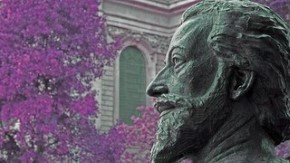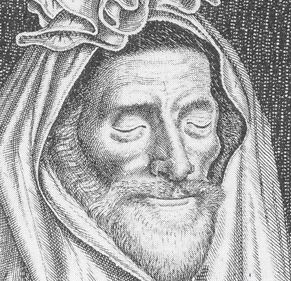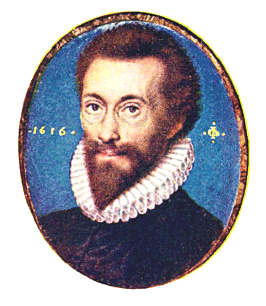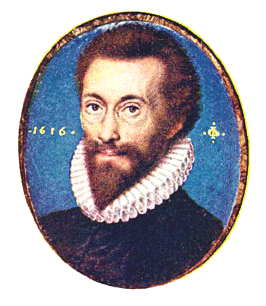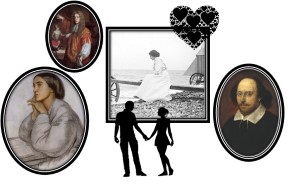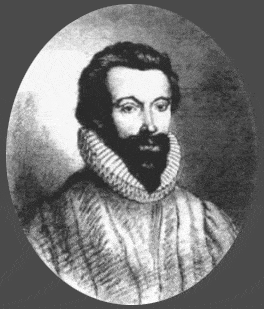
Donne, John
John Donne (1572–1631) wrestled with competing ideologies. His early Elegies comprised amorous and liberal poems. In many of his poems, there is an immediacy created by the use of first-person address, which suggests links between the reader and the speaker, and the speaker and Donne. Donne could produce serious and passionate love poems alongside flip and cynical works such as Love's Alchemy. It is often felt that his best poems mix protest and feigned disbelief.Donne lived through turbulent times. He witnessed the break-up of an old order; engaged with disturbing scientific progress; embraced the growth of scepticism; and wrestled apprehension of violent death, persecution and intolerance. His poems reflect his struggle to establish an identity and a faith when ‘the new philosophy calls all in doubt’.
Catholic saint and lawyer Sir Thomas More was a great uncle of Donne's mother, who herself remained Catholic until her death in 1631; his uncle Heywood led the Jesuit mission from 1581–1583 and was exiled under threat of death. Donne had been educated at Oxford and Cambridge at a time when Catholics could not take a degree, and gained some acclaim, later being made Master of Revels at Lincoln's Inn in 1593.
Despite Donne’s early social and academic successes, suspicions regarding his links to Catholicism limited his prospects at court. The threats to his personal safety as a result of these suspicions were real, with his own brother dying in Newgate Prison, having been sent there for harbouring a priest. Donne publicly left the Catholic Church and, as a sign of patriotism and loyalty, embarked on Raleigh's expeditions to Cadiz, later venturing with Essex to the Azores. Donne had risen to the post of MP, but, after marrying the niece of his patron Sir Thomas Egerton in 1602, was socially ostracised when Jesuits were falsely linked to the Gunpowder Plot.
It could be argued that the seventeenth century had seen a cultural shift. England was riven with religious divide and this was a matter that people were willing to die for, with the shifting dominance of Catholic and Protestant faiths under Mary and Elizabeth contributing to persecution and the creation of martyrs from both faiths.
Donne had written attacks on the extremist factions of his former church in 1610 and 1621. The King urged him to take holy orders in the Protestant faith of the Church of England. Donne initially refused, feeling himself not worthy, but was ordained an Anglican priest in 1615, before becoming the Royal Chaplain and then the Dean of St Paul's in 1621. His initial reluctance may have been from a genuine need to find a true church and faith.
Strength of feeling can be found throughout Donne's work. He presents a voice which argues aloud, in order to define and dramatise a moment or a mood. The reader may see flashes of the preacher in his structured arguments. While his verse was privately admired, it was not published until after his death in 1631.
Donne's use of wit and ingenious argument was not always admired by his fellow writers. The writer Ben Jonson criticised Donne's method of employing a persuasive speaker as an attempt to ‘perplex the minds of the fair sex with nice speculations of philosophy’. Jonson disliked the fact that what some consider wit in Donne is ‘the most heterogeneous ideas … yoked by violence together’. He continues to warn that Donne ‘for not being understood would perish’, yet acknowledges his distinctive characteristics, ‘the first poet in the world for some things’.
The robust nature of Donne's verse echoes the violent masculinity of the times. Masculinity was frequently linked to the political body. Gender prejudice was structural and ultimately complicated by having a woman, Elizabeth I, as monarch. Donne was part of a male coterie, but not defined by it. He set his own rules. In Donne's own words: ‘I can allow myself to be animale sociale, appliable to my company, but not gregate, to herd myself in every troop’ (Donne's Letters, Letter XXXVII, 'To all my friends: Sir Henry Goodyere').
Many of Donne’s love poems engage with issues of gender, love and personal identity. Some of his earlier Elegies argue women's inferiority is part of their material make-up. Others present more enlightened images of love and women; some focus on intimate male friendships. Donne's Elegies can be seen as typical of Renaissance misogyny. Achsah Guibbory felt that the elegies ‘reflect a prevailing male discomfort with the country's female ruler, Elizabeth’.
In ‘The Flea’, the central argument revolves around a pun on the Holy Trinity. Donne employs a religious image that would have been easily understood by his peers. There is a vein of sensuality which is presented in the texts dealing with religious themes that the reader may find surprising. The intermingling of erotic and religious imagery is perhaps less surprising given Donne's own history. The instability and ambiguity created by Donne's conversion from Catholicism to Protestantism, and his genuine belief in sin as a state of mind, pervades his work. As a preacher, he would reflect upon faith, and his sonnets encourage Protestant models of introspection.
In the Holy Sonnets, we see Donne's conflicting allegiances, his insecurity and his struggle with self. There seems to be a clear split in his output before and after 1615. He had written a prose defence of suicide in Biathanatos, although he later distanced himself from it in 1619, claiming it was a book produced by the naive ‘Jack’ Donne, not the experienced Doctor Donne, Dean of St Paul's. It is not so much a case of him deliberately reinventing himself as much as him genuinely feeling himself to be an altered person. At times he attacks his previous faith of Catholicism, yet there is also evidence of ambiguous use of images and even a robust use of Catholic doctrine and allusion in the poems.
Donne would at times seem to have an inclusive view of Christian faith, and much of the conflict in his work comes from his struggle to create or preserve self. Donne uses the Protestant ethic, which values individual conscience, to defend individual Catholic beliefs.
While Donne felt he had abandoned the Catholic faith, he felt his ties to the More family and his mother’s refusal to convert, along with his belief that he would dishonour the Church of England and himself if society was not wholly convinced of his conversion, contributed to his refusal of the Anglican ministry in 1607. Donne finally entered the ministry in 1614.
T S Eliot, himself a convert, found Donne's uncertainty regarding the nature of his spirituality ‘dangerous’, asking whether his distinctive style and employment of religious imagery ‘was his clearly genuine piety distinctly shaped and animated by his apostasy’. The restlessness and energy throughout the poems is almost indicative of a lack of established religious zeal, a lack of anchorage. In this light, Donne’s Holy Sonnets can be as much read as poems written to himself as to a wider audience.
Donne finds himself the model of the Protestant sinner. In Sonnet 14 (‘Batter My Heart...’), Donne feminises the sinner. In his Elegies and Songs he moulded women in various ways. Here the speaker desires to be shaped by God. There is a sensuality in the religious imagery. Donne longs for the divine touch of God. There is still a degree of ambivalence, as the eye of God is regarded as both threatening and comforting.
Donne's poetry was a medium for dialectic argument, for monologue and for psychological analysis. He returns to a number of themes, such as resolution of doubt; reconciliation of opposites; the integration of inner and outer worlds; the integration of thought and feeling; and the examination of man's personal relationship to God. Donne's poetry leans on paradox because it appeals to an intelligent mind. It is a vehicle for exploring contradictions in life.
There is much in Donne's poetry to engage the modern student. His comparisons can be novel and shocking, while the manipulation of diction and metre to create the dramatic context of a heated argument speaks to the reader in a direct and forceful way. His outrageous treatment of human psychology, love and religion encourages debate and personal response. Students may not always agree with his ironic and cynical view of love, but they should find much to appreciate in the metaphysical style.
Further Reading
© ZigZag Education 2026: content may be used by students for educational use if this page is referenced.
Show / hide details
| 1572 |
Birth
|
|
| 1592 |
Education
|
|
| 1594 |
Early Writing: Satires, Songs and Sonnets
|
|
| 1596 |
Donne, the patriot
|
|
| 1598 |
Donne at court
|
|
| 1601 |
Donne in shame
|
|
| 1607 |
Return to poetry: Divine Poems
|
|
| 1610 |
Pseudo-Martyr, Divine Meditations (also named as Holy Sonnets)
|
|
| 1615 |
Declaration of faith
|
|
| 1617 |
Grief and God
|
|
| 1621 |
Lead preacher
|
|
| 1624 |
Devotions upon Emergent Occasions
|
|
| 1631 |
Death
|
|
| 1633 |
Collected works
|


